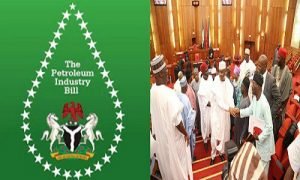*Say Bill lacks right framework for investments *Doesn’t address challenges facing gas development *Bill could potentially lead to disputes

OpeOluwani Akintayo
Lagos – Nigeria’s oil and gas industry operators have raised issues over certain provisions in the revised Petroleum Industry Bill, PIB, which, according to them, remain of concern to the industry.
The Bill is currently being debated at the National Assembly, which has expressed readiness to pass it into law before the end of the first half of this year.
The issues were presented by Mr. Mike Sangster, Chairman, Oil Producers Trade Section, OPTS, on behalf of the group at the Senate public hearing on the Bill in Abuja.
According to OPTS, the issues have the potential to hinder the realisation of the PIB’s laudable objectives, reduce Nigeria’s global competitiveness and deter the much-needed investments to grow new projects.
OPTS is an oil and gas industry group operating under the umbrella of the Lagos Chamber of Commerce and Industry, LCCI. It represents the interests of 30 indigenous and international oil and gas companies, and operates approximately 90% of Nigeria’s oil and gas industry production in partnership with the Nigerian National Petroleum Corporation, NNPC, or other local and international lease holders.
The operators argued that the PIB does not present favourable environment for future investments and for the launching of new projects, lacks key enablers for domestic gas development and does not clearly preserve the terms of existing investments.
They also said the document segregates between upstream and midstream deemed assets, contains several provisions that introduce administrative complexities and ambiguities that could potentially lead to disputes and does not broadly support the growth of all indigenous companies by providing specific provisions and incentives.
They maintained that the PIB does not clearly preserve the terms of existing investments and stated: “Preservation of base business and rights simply means honouring existing agreements and it is critical to promoting a stable business environment and maintaining investor confidence”.
Speaking at the first 2021 public hearing of the Bill at the National Assembly, Sangster, who is also the Chief Executive Officer, Total E&P Nigeria Limited, proposed the removal of hydrocarbon tax in the revised PIB.
He said the removal of the hydrocarbon tax was necessary considering that companies would still be subject to Company Income Tax, CIT
He also said the bill failed to address the key challenges facing gas development in Nigeria, such as inadequate midstream infrastructure, regulated gas pricing, huge and long outstanding debts, thereby potentially jeopardising the realisation of government’s aspirations for the domestic gas sector.
He suggested that the bill “provide a clear path for transitioning to free market-based pricing, not add additional compliance conditions on domestic gas delivery obligations as a precondition for export gas supply and allow pre-existing contracts and agreements to run their course”.
PIB: NNRC urges NASS to prioritize key recommendations, quick passage
The PIB, Sangster continued, “does not clearly preserve the terms of existing investments”.
“OPTS recognises the government’s right to change laws. However, to maintain Nigeria’s reputation amongst investors, it is important for the PIB to explicitly preserve base businesses and rights for existing Joint Venture licenses and leases and Production Sharing Contracts, which form the basis for future growth.
“Operators should be allowed to retain the entirety of their lease areas and new terms should apply only to new contracts, licenses and leases,” he said.

The PIB had suffered setbacks for about 20 years. It proposes the scrapping of the Nigerian National Petroleum Corporation, NNPC, and the Petroleum Product Pricing Regulatory Agency, PPPRA.
It also proposes creation of the Nigerian National Petroleum Company Limited as well as the establishment of the Nigerian Upstream Regulatory Commission and the Nigerian Midstream and Downstream Petroleum Regulatory Authority.
The industry concerns as presented by the OPTS are summarised into the following key issues:
Deepwater developments
OPTS argued that deepwater developments have contributed significantly in maintaining Nigeria’s oil production levels by offsetting the decline in the Joint Venture production, adding that it has also enabled Nigerian content and local capacity development.
However, according to the group, despite significant discoveries, underdeveloped resources still exist in Nigeria’s deepwater sector, and are challenged with the tightening of fiscals and uncertainty in gas terms.
The operators said these will require the right balance of government take, incentives and enablers critical to future competitiveness in the global context.
“Unfortunately, our review of the PIB shows that the deepwater provisions do not provide a
favourable environment for future investments and for the launching of new projects”, they said.
To ensure investors are encouraged to finance deepwater projects, they advocated that the PIB should grant deepwater oil projects a full royalty relief during the first 5 years of production or a graduated royalty scheme.
PIB, according to them, should also remove hydrocarbon tax considering that companies will still be subject to Companies Income Tax, CIT.
“Deepwater non-associated gas resource development is particularly challenging and requires targeted measures to get projects off the ground. A full royalty relief during the first 5 years of production and a 1% royalty for natural gas, natural gas liquids as well as the condensate/liquids from such development would encourage investment in deepwater gas projects,” they maintained.
Lack of key enablers for Domestic Gas development
Nigeria, they stressed, has vast gas resources, enough to meet both the domestic requirements and satisfy export demands that generate substantial government revenue.
They stated that if properly developed, these gas resources could be a catalyst for economic development; helping to solve the perennial electricity problem, drive gas-based industries, create thousands of jobs, thus enabling the transition to a diversified, gas-based economy”.
However, they said the PIB does not address the key challenges facing gas development in Nigeria, such as inadequate midstream infrastructure, regulated gas pricing, huge and long outstanding debts, etc., thereby potentially jeopardising the realisation of government’s aspirations for the domestic gas sector.
“The PIB should provide a clear path for transitioning to free market-based pricing, not add additional compliance conditions on domestic gas delivery obligations as a precondition for export gas supply and allow pre-existing contracts and agreements to run their course,” they recommended.
Preservation of base businesses & rights
They said: “Preservation of base business and rights simply means honouring existing agreements and it is critical to promoting a stable business environment and maintaining investor confidence. As you know, oil and gas projects require billions of dollars in up-front investments and it takes many years before the investments are recovered. Thus, it is crucial to investors that contract terms on which these huge investments were made, are respected”.
The OPTS said the PIB, however, does not clearly preserve the terms of existing investments.
“OPTS recognises the government’s right to change laws. However, to maintain Nigeria’s reputation amongst investors, it is important for the PIB to explicitly preserve base businesses and rights for existing Joint Venture licenses and leases and Production Sharing Contracts, which form the basis for future growth. Operators should be allowed to retain the entirety of their lease areas and new terms should apply only to new contracts, licenses and leases,” the group stated.
According to the group, this will give investors the opportunity to consider the new terms prior to making investment decisions. “Over the years, Nigeria has built a strong reputation for honouring its contracts. We hope that this long-standing tradition will be upheld in the PIB,” it added.
Segregation of Upstream and Midstream deemed assets
The operators maintained that the new PIB requires that companies operating consolidated upstream and midstream assets separate and incorporate their midstream assets as distinct legal entities, stressing that the proposed framework may be applicable for new projects, but not for assets developed on an integrated basis.
An imposed segregation along upstream and midstream for existing assets, they said, could jeopardise the integrity of past investments for assets that were technically and commercially designed to operate on an integrated basis.
“The PIB has therefore omitted the inclusion of a grandfathering framework to ensure that such assets are allowed to complete their lifecycle. The PIB should include a savings provision to allow post-conversion continuity of activities undertaken by a single legal entity, instead of being segregated as independent companies. Where assets are required to be segregated, a provision for the specific exemption of associated taxes should be considered e.g., Capital Transfer Tax, Capital Gains Tax,” they recommended.
Administrative complexity and absence of robust dispute resolution framework
The said: “There are several provisions in the PIB which introduce administrative complexities and ambiguities that could potentially lead to disputes. These include the introduction of a dual tax system for multiple terrains which complicates tax reporting, and new taxes and levies that are in addition to the already existing plethora of taxes, fees and levies which the industry is subjected to.
“PIB should consider harmonising the taxes into a single tax system and allow for consolidated filing and tax reporting. PIB should address this issue of plethora of taxes, and stop the penchant for other government agencies to see the oil and gas industry as an easy source of their internal revenue”.
Furthermore, they said a significant omission in the PIB is a clear dispute resolution mechanism, which is critical to strengthen investor confidence.
“Under the PIB, several agencies have the power to make final rulings on matters without recourse to judiciary or independent arbitration. Access to a fair and independent dispute resolution mechanism is key in providing an equitable and stable investment environment and it is a globally-accepted practice.
“Today, disputes are resolved in accordance with Nigeria Law under the Arbitration and Conciliation Act. Parties to the dispute are afforded a fair and independent resolution mechanism with access to arbitration and the judicial system. The PIB should recognize the current law rather than implement a potentially biased system to minimise the emergence of future disputes,” they said.
Capital allowances and deductions
The PIB, according to them, currently prohibits deductions of Capital Allowance pre-production for Hydrocarbon Tax, HT, purposes, which is not consistent under Companies Income Tax, CIT, provisions.
“The PIB should seek to harmonise tax practices and ensure capital allowances and allowable deductions are consistent with existing tax legislations, Companies Income Tax Act (CITA). Indeed, deductions of Capital Allowance for assets under construction for HT should have the same treatment as under CITA for all terrains, and deductions for Hydrocarbon Tax should follow WREN (Wholly Reasonably Exclusively Necessary) practices. Lastly, since royalties are not costs incurred by a company during its operations, they should be explicitly excluded in the cost calculation of the cost price ratio and the limit should be increased from 65% to at least 70% of revenue,” the operators further recommended
Preservation of earned rights and investment integrity for marginal fields
Indigenous operators, they said, have continued to play an increasing role in the development of Nigeria’s oil and gas industry. After over 50 years as an oil-producing nation, Nigerian indigenous companies account for about 14% and 9% of daily oil and gas production respectively.
“While the PIB provides for reduced royalties for small producers (<15,000bpd) and small field allowances for marginal field producers, it does not broadly support the growth of all indigenous companies by providing specific provisions and incentives. For example, gas projects by indigenous companies are equally or more adversely impacted due to the removal of gas cost consolidation with oil revenues. Companies should be allowed to operate their marginal fields under the current royalty rates and farm out agreements,” they said.
In conclusion, the group said they hoped that the memorandum they had submitted, as well as the contributions of other stakeholders, would result in a law that will help create an efficient and effective institutional framework to meet Nigeria’s current and future needs.
“We fear that if the PIB is passed in its current form, it will not meet the Government’s objectives of making Nigeria the leading destination for oil and gas investment and the recent scarcity of investment – only $3 billion out of $70 billion in Africa – will continue.
“Therefore, we very much look forward to continuing to engage with you constructively to develop a PIB which is a win-win for both Nigeria and investors, that will stimulate investment and generate jobs and revenue for the people of Nigeria,” they said.
Total makes own case
Total Upstream Companies, on its part as one of the operators in the country, urged the Federal Government to honour existing agreements in the PIB 2020. According to Total, sustaining terms in old contracts is fundamental to maintaining and building investor’s trust that Nigerian opportunities will perform into the future.
The company affirmed that although the 2020 Bill goes some way to preserve existing contract terms with a voluntary conversion mechanism, it also cancels key tax benefits accrued from prior investments, such as the forfeiting of earned investment incentives not taken by the conversion date. It said the Bill requires the termination of all ongoing dispute resolution processes regardless of the substance of the claim, adding that it voids any stabilisation provisions or guarantees agreed with the national oil company, NNPC.
“Indigenous Sole Risk contracts are especially exposed as the PIB does not recognise and preserve the specific terms established in the Letter of Awards for these leases.
“Investor confidence requires that existing agreements should be honoured, earned tax benefits should be retained and carried forward, and savings provisions should be provided to allow indigenous lease holders with Sole Risk contracts the option to preserve their fiscal terms”, it said in the address presented by its chief executive officer, Mr. Sangster.
Deep offshore
In the deep offshore, Total impressed that it has championed development in Nigeria and invested significantly over the past years despite the challenging environment.
The Egina project commenced production in December 2018 and reached its production plateau of 200,000 barrels per day in May 2019 delivering 10% of the total oil production in the country. The Floating Production Storage and Offloading, FPSO, unit is the largest ever installed in Nigeria and is a landmark project in terms of local content, the company said. It added that 48 million manhours were worked in country which represents over 70% of the total workload, and over half a million manhours of local training was delivered.
“Egina demonstrates that a world-class development can be delivered within the framework of Nigerian content legislation and can build significant local capacity for future projects.
“This investment by Total and its OML130 partners was feasible due to an enabling investment framework in the deep offshore that recognised the specific challenges of this sector.
“Such a landmark investment would not have been sanctioned under the deep offshore terms proposed in this PIB; they are simply not competitive,” Sangster told National Assembly members.
Despite lowering the tax rate, Total argued that the Bill retains the penalising high royalty rates of the Deep Offshore Act; removes established investment incentives and replaces them with a production allowance of limited value, and increases administrative complexity with the new Hydrocarbon Tax.
The company said: “The terms are less competitive than those we currently have and make most new deep offshore projects unviable.
“Total recommends the proposal made by OPTS to support the deep offshore with the implementation of a 5-year royalty relief mechanism available on all leases from enactment. We also recommend the removal of Hydrocarbon Tax in the deep offshore with taxation under the Companies Income Tax only and making Production Allowances deductible for CIT. All these measures are required to ensure the successful exploration and development of Nigeria’s large deep offshore resources”.
The company then added that FG considering its key observations as a stakeholder that has contributed immensely to the development of the Nigerian economy, would go a long way to achieve a balance and successful legislation for the benefit of all stakeholders, fulfilling government’s intent to deeply reform the Nigerian oil and gas sector.



